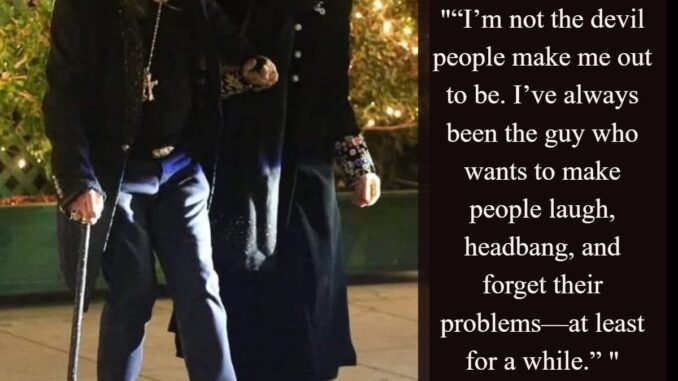
The end of a legend Ozzy Osbourne, often dubbed the “Prince of Darkness,” rose to fame as the lead vocalist of Black Sabbath, the band that pioneered heavy metal with albums like Paranoid (1970), Master of Reality (1971), and Sabbath Bloody Sabbath (1973). After his departure from Sabbath, he launched a highly successful solo career with albums like Blizzard of Ozz (1980), featuring “Crazy Train.” Despite his dark image and shocking stage antics, Ozzy has always maintained a humorous and self-aware personality. His quote reflects this duality—he plays a character on stage, but off-stage he is a devoted family man and a fan of comedy and pranks. Ozzy’s influence spans generations, and he helped launch the careers of countless guitarists, including Randy Rhoads and Zakk Wylde. His long-running Ozzfest tour brought heavy metal to new audiences. More than just a singer, Ozzy became a pop culture icon, blending outrageousness with authenticity……Read more
The End of a Legend: Ozzy Osbourne’s Final Bow
800-word news paraphrase
Ozzy Osbourne, famously known as the “Prince of Darkness,” stands as one of the most enduring and influential figures in the history of rock and heavy metal. Rising to fame in the early 1970s as the lead singer of Black Sabbath, Osbourne helped forge an entirely new genre of music. Albums like Paranoid (1970), Master of Reality (1971), and Sabbath Bloody Sabbath (1973) laid the groundwork for what would become heavy metal—dark, powerful, and unrelenting in its sound and subject matter.
With his haunting vocals and theatrical stage presence, Ozzy quickly became a figure both feared and revered. But behind the grim aesthetic and eerie persona was a man of deep contradictions—one who thrived in the limelight yet remained surprisingly grounded. His departure from Black Sabbath in 1979 could have spelled the end of his career, but instead, it marked a remarkable new beginning.
In 1980, Osbourne launched a solo career that would further cement his legacy. His debut solo album, Blizzard of Ozz, featured the now-iconic track “Crazy Train,” and introduced the world to the virtuosic guitarist Randy Rhoads. Together, the two created a sound that was melodic yet heavy, deeply emotional yet sonically ferocious. Even after Rhoads’ tragic death in a 1982 plane crash, Ozzy continued to thrive, later partnering with guitarists like Jake E. Lee and Zakk Wylde, and releasing a string of successful albums including Diary of a Madman and No More Tears.
Throughout his career, Ozzy embraced his wild reputation, famously biting the head off a bat on stage (an act he later admitted was accidental). But those who knew him best recognized another side to the metal icon—a playful, deeply funny man who loved practical jokes, sitcoms, and family life. This duality became more apparent with the launch of The Osbournes, a reality TV show that aired in the early 2000s and brought Ozzy into the homes of millions. Far from the demonic figure many imagined, viewers saw a bumbling, lovable father navigating domestic chaos with wit and weariness.
Ozzy’s influence reaches far beyond his own music. Through his annual touring festival, Ozzfest, he provided a platform for both veteran and emerging metal acts. Bands like Slipknot, System of a Down, and Lamb of God all gained major exposure through the festival, furthering heavy metal’s reach into the mainstream. He was never afraid to evolve, to collaborate, or to embrace younger artists. In many ways, his willingness to adapt and remain culturally relevant has kept his legacy alive across decades.
Despite ongoing health struggles, including a Parkinson’s diagnosis and several surgeries in recent years, Ozzy’s passion for music and connection with fans never faded. Even when his touring abilities diminished, he remained active—recording new material, making surprise appearances, and offering raw, heartfelt interviews that revealed his vulnerability and gratitude for a life well-lived.
As tributes now pour in from across the globe, fellow musicians, fans, and family members are reflecting on the massive footprint Ozzy has left behind. For many, he was more than a performer—he was a movement, a spirit, and a symbol of rebellion mixed with resilience. His voice, unmistakable and powerful, told stories of fear, war, addiction, and redemption.
But above all, Ozzy Osbourne’s story is one of endurance. From the streets of Birmingham to the heights of global stardom, from scandal and substance abuse to spiritual growth and family devotion, he has lived a life few could imagine. His music gave a voice to the misfits and outsiders, and his persona—part gothic, part goofball—made him one of the most paradoxical yet beloved figures in music history.
As the curtain closes on an extraordinary journey, fans take solace in the fact that while Ozzy may no longer take the stage, his legacy remains immortal. Through every riff, every scream, and every laugh, the Prince of Darkness continues to shine.
He was, and will always be, more than just a man in makeup and mayhem—he was Ozzy. And there will never be another like him.
Leave a Reply